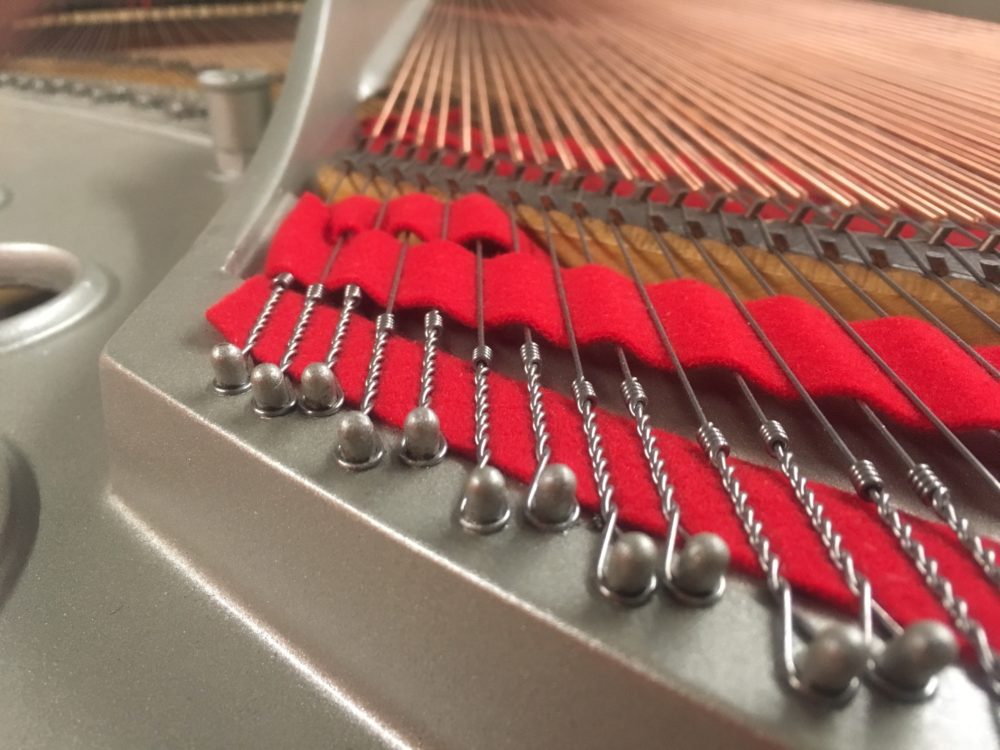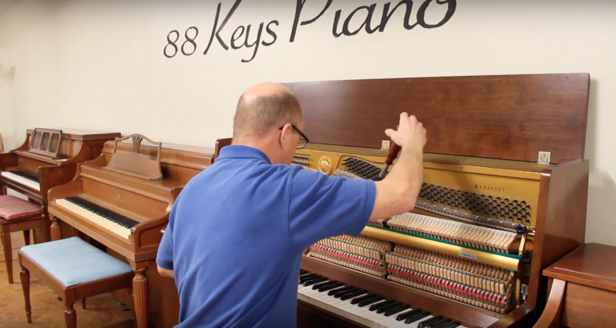Tuning
“How will I know when it’s time to tune my piano? And how often does it need to be tuned?”
These are the most often asked questions we receive. The answer to the first question is easy: By looking to the calendar, not your ear!
If your ear tells you it’s time to tune your piano, then it’s probably way too late for just a straight tuning to fix your piano’s issues! To the average ear, you won’t hear your piano “go out of tune.” The truth is, the second your piano technician walks out your door, the “going out of tune” process has already begun!

Not too comforting, huh? But here’s why.
An in-tune piano is tuned to Concert Pitch, better known as “A440” pitch. What this means is that the A above middle C has been designated as the US standard across the board for measuring pitch. This note, or its string, should vibrate at exactly 440 vibrations per second (better known as 440Hz, or, commonly referred to as “A440”). This is the stable pitch that has universally been accepted across all instrument families over centuries of history.
Now, even though a piano has 88 keys (hence our company name), it has over 200 strings (the bass notes have only one string, most of the tenor notes have two strings each, and the treble notes have three strings each)—each of which is being pulled to over 200 lbs. of tension! Imagine a 200 lb. man hanging from each of your 200+ piano strings. Over time, and especially during climate and humidity changes, this tension weakens and needs a “re-tension,” better known as a tuning). The problem is that often most of the strings will “relax” and lose tension at a common rate, thus fooling the player into thinking that his piano is still in tune. In reality, however, it’s only “in tune” with itself—no longer at A440.
Some may wonder, “Well, what’s wrong with that? I’m not a professional player—I just play for my own enjoyment. As long as it’s mostly in tune with itself, isn’t that good enough?”

A resounding no! First of all, your instrument was designed to be tuned at standard pitch. All of the inner workings of your piano (the soundboard, the cast iron plate, the tuning pins, the bridges) are assuming that your piano strings will be held at 200 lbs. of tension. If left to itself, your piano will continue to decline in pitch (trust us, it won’t stay at “just a hair flat”), resulting eventually in such a drop that serious problems will occur when trying to re-establish its pitch: broken strings, cracked soundboards, stripped tuning pins, even cracked plates—we’ve seen it all! Since all the parts were created and designed to work together, including the pitch of the strings, your instrument cannot continue to function when one part doesn’t want to hold up its end of the deal. Those strings must be kept to A440.
Secondly, keeping your piano at anything less than Concert Pitch is a great detriment to the musical training of a child. Those who have been blessed with perfect, relative, or even good pitch will suffer greatly when trying to gel their musical ability with their piano’s deficiencies. Children are too young to comprehend and discern what the imperfect discrepancy is. They will simply defer to what the instrument is telling them. Proper ear training cannot be established in a child without proper pitch being held as standard.
Thirdly, music will not be able to be enjoyed as a community if the piano is not in tune to Concert Pitch. Other instruments, such as strings, winds and brass, will have to either “adjust and play out of tune on purpose” (who would want that for their developing clarinetist or violinist?!), or retune their instrument to the out-of-tune piano, which is simply bad for any instrument or musician.
Wonderful service by Jon! I bought a piano for a very low price and prayed it could be tuned. Jon did an amazing job with the tuning and was very polite and professional throughout the entire process! I had originally contacted the piano store in the mall and they had a hard time with their schedule and took many days to return my call. I am grateful that they did. No need to go anywhere else! 88 Keys Piano and Jon is just what I need! Thank you for your time! See you for the next tuning! God Bless you and your family!
Christina C., Pooler, GA
In conclusion, regular tuning and maintenance will be the only thing that will keep your piano at A440 on a regular basis, prolonging the life of your investment.
So then, how often should you have your piano tuned?
The Steinway and Baldwin Piano Corporations recommend the following tuning schedule for new pianos or pianos that have been moved:
First year: Tune every 3 months.
Second year: Tune every 6 months.
Third year and beyond: Tune at least every 12 months, preferably every 6 at the change of seasons.
We at 88 Keys Piano recommend that all home users tune their instrument at least once per year. We recommend that churches, schools, and institutions tune every 3-6 months.
Remember: a piano has to be tuned for the instrument, not for the player. And a happy piano makes a happy player!